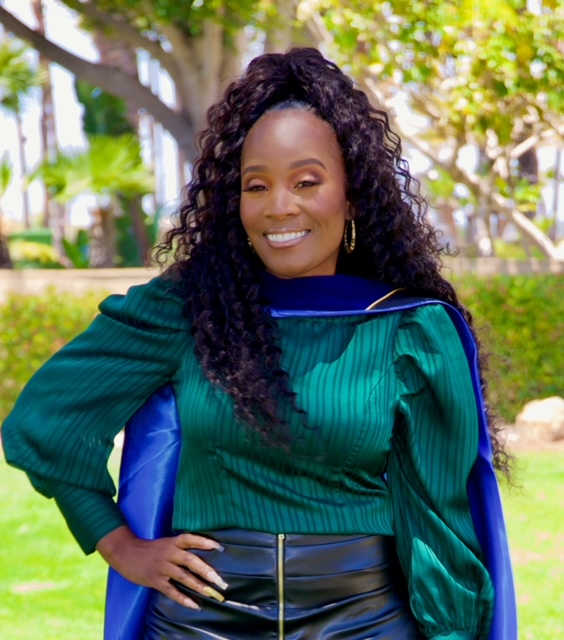Did you know that every year on September 25th, we observe National Psychotherapy Day?
Mental illness was once overlooked and not considered a real health issue. However, people now recognize that good overall health requires both physical and mental well-being. It’s shocking to learn that only 4% of the 192,497 therapists in the country are Black, according to a 2022 study by Zippia. To address this issue and make mental health a comfortable topic, let’s meet these amazing women of color who are committed to promoting mental well-being.
Keisha Saunders-Waldron LCMHC.

Keisha is a licensed professional counselor supervisor who works with individuals and families to improve their quality of life through the use of counseling and holistic approaches. Mrs. Waldron also holds a seat on the Licensed Professional Counselors Associate of North Carolina as a member at large. As a result of her skill set at various places, Keisha has produced healthy, enduring results for high-echelon clients including R&B artists, NFL Football players, senior corporate executives; and general counsel for all. Keisha holds a Master’s degree in Science and Service Agency Counseling from the University of North Carolina at Pembroke as well as a Bachelor’s degree in Arts and Science in Psychology with a minor in Sociology from the University of North Carolina at Greensboro. She is an extremely accomplished Licensed Professional Counselor Supervisor at Confidential Confessions Counseling Services, with 15 years of experience in the mental health field.
In a recent conversation with us, she shared her thoughts on some questions we had regarding the topic of mental health.
Why do you feel mental health is not taken seriously in the black community and how can we change that?
The perception of mental health within the Black, Brown, and Indigenous communities, is often not afforded the level of attention it deserves as these communities in particular face significant challenges. Several factors contribute to this issue and addressing them is vital for creating a positive change. Historically, there has been a tendency to view individuals within these communities, particularly Black people, as exceptionally resilient and capable of enduring any hardship. Emotions, on the other hand, have sometimes been seen as something to overcome rather than a natural part of the human experience. Expressing emotions, especially vulnerabilities, has at times been stigmatized, leading to feelings of guilt and shame for those who do open up.
Spirituality plays a central role in the black community, influencing how emotional well-being is approached, adding to the complexity of mental health concerns within the community While spirituality can be a valuable source of support, it is essential to recognize that some situations, potentially traumatic experiences, can disrupt the delicate chemical balance in the brain and body. In such cases, a combination of spiritual and medical interventions, such as prayer and medication, may be necessary to promote emotional regulation and improve one’s overall well-being.
How can we change that?
To fight the stigma/ change the seriousness surrounding mental health in these communities, it is crucial to foster a deeper understanding of what mental health truly entails and what it does not. Enhancing education and awareness regarding mental health can be a pivotal catalyst for reshaping perspectives that might stop individuals from seeking the necessary assistance, including counseling and other available resources, which can help their personal growth and self-improvement. Through knowledge and awareness, we can challenge derogatory labels such as “crazy,” which unfairly stigmatize those facing difficulties in managing their emotions. While psychiatric hospitals are sometimes necessary/needed for some individuals who pose a threat to themselves or others, most seeking counseling do so with the hope of gaining self-awareness and reconnecting.
Many are looking for ways to identify what mental illness looks like. Would you say mental illness has a face?
No, mental health does not have a face that we can all identify. Identifying mental health issues involves assessing various aspects of an individual such as how they function in their job, how they are doing in school, what’s changed recently, and do they have successful relationships. People have become very clever at concealing their inner struggles behind smiles, a phenomenon we’ve observed frequently. It’s important to note that conditions like depression or suicidal thoughts may not be evident, as they can be concealed by a facade of happiness. To help, one must observe to gain awareness to how their person (loved one, friend, colleague) has changed.
Why did you choose this career path and what change do you hope to bring about in a system that seems to ignore those crying out quietly for help?
I embarked on my career journey at an early age, at first influenced by something as innocent as cartoons. However, this path has evolved significantly over time, and I find myself continually astonished by the transformations that unfold before me. Right now, my primary objective is to contribute to policy initiatives aimed at bolstering counseling programs, thereby increasing the number of available counselors to address the growing deficit in mental health support. Simultaneously, I am dedicated to identifying additional resources to aid individuals who are struggling with thoughts of suicide (something that has become very personal over the years due to family). Despite the existence of some resources, they prove at times insufficient to contend with the ever-rising number of people who find themselves devoid of hope, resorting to desperate measures. I believe it is imperative to emphasize that everyone holds intrinsic value, and their well-being remains at the forefront of my commitment and dedication to this cause.
Breland-Noble, A. M., Wong, M. J., Childers, T., Hankerson, S., & Sotomayor, J. (2015). Spirituality and religious coping in African American youth with depressive illness. Mental health, religion & culture, 18(5), 330–341. https://doi.org/10.1080/13674676.2015.1056120
Taylor, H. A., Jr., Washington-Plaskett, T., & Quyyumi, A. A. (2020). Black Resilience – Broadening the Narrative and the Science on Cardiovascular Health and Disease Disparities. Ethnicity & disease, 30(2), 365–368. https://doi.org/10.18865/ed.30.2.365
Verghese A. (2008). Spirituality and mental health. Indian journal of psychiatry, 50(4), 233–237. https://doi.org/10.4103/0019-5545.44742

Principal Consultant and Strategist Shaneè C. Morgan, PsyD is the Founder of Dennis-Morgan Coaching & Consulting. Dr. Morgan has a background in Human Development, Public Administration and Social Change Psychology, Behavioral Health Leadership Psychology, Motivational Speaking, and Career Development. She’s recognized by the National Society of Leadership and Success, and the Psi Chi International Honor Society in Psychology. With over 20 years of experience in administration, teaching, and facilitation in various capacities. She has taught and worked at the grade school level in the public and private sectors. Dr. Morgan has also worked as a Facilitator, Consultant, and Professional Development Trainer, providing consultation to individuals and families, and extensive training for educators and social and behavioral services professionals. In addition to training, she’s provided mentorship to individuals and groups in various settings. Dr. Shaneè seeks to help individuals who desire assistance identifying their personal, professional, and academic goals, as well as those needing support in the areas of personal growth and behavior modification. Lastly, she’s a captivating motivational speaker and loves to touch on topics such as resilience, overcoming adversity, goal setting, and more.
In a recent conversation with us, she shared her thoughts on some questions we had regarding the topic of mental health.
Why do you feel mental health is not taken seriously in the black community and how can we change that?
Mental health is not taken seriously in the black community because oftentimes we are taught that mental health issues are personal matters and many of us were raised to keep our personal issues and business in the home or to ourselves. For many, mental health issues are seen as a weakness, and in the black community we are raised to be strong and shake everything off; unaware that not everything can just go away without effective and appropriate intervention. In some cases, mental health is not even acknowledged because there has been no education on how to recognize signs, symptoms, and different types of mental health issues.
Additionally, within the black community, there is a distrust toward medical/mental health professionals, as well as the feeling that mental health professionals can not relate to our situations, thus there is no way they can help recognize and effectively help resolve such issues, and the belief that mental health professionals can not relate leads to the thought that they simply can not help.
Many are looking for ways to identify what mental illness looks like.
Would you say mental illness has a face?
Mental illness does not have a face. It is non-discriminatory, and it is not like diagnosing other chronic diseases. It’s more subjective and affects the brain. Mental illness affects a person’s mood, behavior, and thinking; however mental illness can also have a drastic physical impact on the body. Mental illness can strike at any time in a person’s life, and stem from a variety of genetic and environmental factors.
Why did you choose this career path and what change do you hope to bring about in a system that seems to ignore those crying out quietly for help?
I chose this career path because I understand the importance of helping those in crisis. Having been a victim of childhood trauma myself, and not having adequate tools, resources, and support to manage, I wanted to be the social change agent, which is what I needed at the time that I was going through difficult situations in my life. I have a passion to be the change I want to see. I feel that the calling on my life is to help others, who have, or are currently experiencing similar issues that I have in the past. Additionally, I have equipped myself with the education and knowledge necessary to take it a step further, and not only share my story, in the form of motivational speaking, but provide the information that is necessary for individuals and organizations to create positive, sustainable methods for improvement in their lives, or within their agencies, which will ultimately result in a positive impact within the community.
Domenique Harrison, MPH, LMFT, LPCC

Domenique also known as The Racial Equity Therapist – is a race and relationships therapist, and an identity equity strategist. Domenique has created curricula and facilitated national training & coaching sessions. Before moving to Los Angeles in 2017, Domenique worked in community care and crisis management. She led educational events and planned responses to disasters. Domenique co-authored two emergency response plans for New York City and New Jersey, organized over 30 events in Med Tech and Healthcare Innovation, and wrote case studies for six UN member countries on their HIVIAIDS workplace programs. Domenique is a Licensed Marriage and Family Therapist (LMFT) and a Licensed Professional Clinical Counselor (LPCC) in California. She earned her Master’s in Clinical Psychology with an emphasis in Marriage and Family Therapy from Pepperdine University, a Master’s in Public Health from New York University, and a Bachelor of Arts in History from Haverford College.
In a recent conversation with us, she shared her thoughts on some questions we had regarding the topic of mental health.
Why do you feel mental health is not taken seriously in the black community and how can we change that?
Several reasons why mental health isn’t prioritized in the Black community stem from our painful history, stigma, limited knowledge, and systemic barriers. Our approach to mental well-being is deeply influenced by historical trauma, oppressive practices, racism in healthcare, and delayed access to treatment.
Living in communities that silenced our pain and invalidated our experiences has left us seeking acceptance elsewhere. We need acknowledgment of our collective past medical injustices, judgment-free continuous care, and access to accurate mental health information to change the mental health landscape. Initiating change begins with accepting spaces like churches, community centers, affinity groups, and families.
Empowering current and future Black folks to become mental health professionals and Black folks to share in their therapy and medication experiences is crucial. Most importantly, we must foster an environment where individuals feel safe to ask questions, explore new options, and challenge limiting social norms.
Many are looking for ways to identify what mental illness looks like. Would you say mental illness has a face?
Mental illness doesn’t have a single face. It often manifests differently in every individual and is shaped by our personal experiences, biological predispositions, and intergenerational and environmental factors. Mental illness can be a complex, pervasive challenge impacting people globally with increasing depth and intensity. While its effects ripple through our international communities, no one is immune to some shared symptoms, signs, and stressors.
However, our present generation, especially Black women, faces a disproportionate burden when it comes to mental health outcomes. Take major depressive disorder, for instance. Many Americans, including Black women, often delay seeking help for years, enduring symptoms like irritability and fatigue. These challenges have cultural implications, leading to misdiagnoses, invalidation, and limited narratives that don’t provide the support needed.
Despite the diverse ways mental health can manifest in our lives, it shares common signs, symptoms, and experiences.
Why did you choose this career path and what change do you hope to bring about in a system that seems to ignore those crying out quietly for help?
Before becoming a therapist, I worked in public health, crisis response, community education, and well-being and systemic health factors impacting access to resources. While I valued creating emergency response plans, planning healthcare educational events, and promoting positive outcomes in sexual health practices, I felt distanced from witnessing individual healing. I yearned for direct connection and collaborative change.
Upon completing my psychology graduate program, I still felt something was missing. I read and completed training on race and oppression, direct non-violent communication, trauma experiences, and cultural narratives. Yet, as I started working with clients, I realized many struggled with unmet relational needs, disconnection from their racial and community histories, and difficulties in expressing themselves.
I didn’t want to see people moving through life on autopilot, causing harm to themselves and others who matter.
And having been a therapist for five years, my commitment has grown stronger to see people living fuller lives, and to empower individuals to become better communicators, build self-awareness, and live authentically in a racially conscious manner. Thriving involves understanding our bodies, minds, identities, and histories. Working with me means finding solutions to our current challenges while connecting to our individual, familial, and communal racialized past.
We hope you enjoyed what was shared and remember to take time out for yourself as often as needed because your mental health matters.
Follow Us On Social Media!




